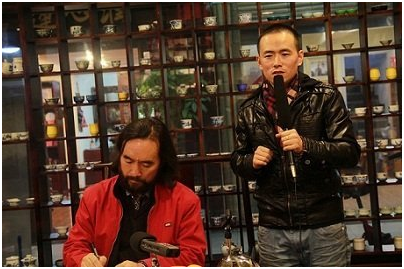My Father Xue Mo and I (4)
By Chen Yixin
translated by J. C. Cleary etc.

Part Four
When my father was a teacher, any time there were holiday periods, he always asked to “keep watch on the school” – to be on duty at the school. This was because when he went home, there were many social engagements, and this wasted time.
One time over the Spring Festival, my father put a set of couplets over the door of the school dormitories. The first line read: “Hey, who set off the firecrackers?” The second line read: “Wow, they are celebrating the Spring Festival!” A horizontal scroll read: “It has nothing to do with me.”
Many people took these as a joke, but I knew the steadfastness and hardship behind the joke.
Our hometown, Liangzhou, is a classic small city of Western China. The people of Liangzhou are very interesting, and particularly content with their lot and always happy. The urban area of Liangzhou city is very small, and it takes no more than ten minutes to drive from one end of the city to the other. It is this small a city, but it has several thousand small-scale teahouses. Besides these, when summer comes, the parks and gardens are full of people. Everywhere there are simple restaurants, with people sitting under the shade of the trees, ordering a Big Plate Chicken and two cold dishes. Later, they bring out a couple of cases of beer, and they play the finger-guessing game, or play cards, or chat. On the walking streets, in the squares, on the tops of the high-rise buildings, wherever there are open spaces with people passing – they are all full of beer stalls and barbecue stalls. If something happens in their family, no matter whether it is important or not, they must have a party, and the sound of the finger-guessing game fills the air, and the party does not break up until they are so drunk they cannot recognize their parents.
One year, a program on China Central TV asked this question: “Where is Asia’s biggest open-air casino located?” The respondents all said Macau, but who knew that the answer was actually the Liangzhou East Gate Botanical Garden in Gansu? This is because it can hold ten thousand people playing mahjong at the same time. After the Liangzhou people heard about this, they laughed out loud: “That's nothing! It’s just the tip of the iceberg.”
The people of Liangzhou are this way: they love to feel contentment, and they are experts in enjoying pleasures. Among this kind of Liangzhou people, my father is an anomaly – he even seems like a freak. He never gets drunk or plays cards, and he does very little socializing. My grandmother always says: “Everything about your father is good, it’s just that he does not understand worldly wisdom.” When grandmother says “worldly wisdom,” she means running around a lot visiting relatives, creating good connections with a lot of people, and, when necessary, currying favor with the leaders. Years ago, when it came to making good connections, my father was not successful. His character was honest and frank, and he would not play up to people, and he would always arouse the ire of the leaders. He was not good at socializing, and his friends were few. In the eyes of many people, he was obstinate and rebellious and too independent.
Speaking of this, there is a little story that is still fresh in my memory.
A long time ago, my father was teaching school in a village. He was an impoverished teacher. Later on, he went through an examination and was chosen to come to a school in the city. At that time, he already had grown a beard. While managing the transfer procedure, the cadre in charge of personnel matters for the Board of Education said to him: “Either you shave off the beard, or you just return to the village to teach.” What astounded everyone was that he actually returned to the village to teach. Some people shook their heads, some laughed derisively, some felt regret. At that time, the village teachers were all jostling to find a way to get to the city, but he was abandoning such a good opportunity for the sake of a beard. Many years later, when he was working for the Board of Education, the leadership again let him make a choice between the beard and working for the education committee, and he still chose to keep the beard. Luckily, he met Pu Long, the chairman of the Board of Education, who appreciated him, and so finally he was kept on at the Board of Education. Later on, Pu Long and his successors did not assign any concrete duties to my father, so he had many years to go off and cultivate practice in seclusion.
Years earlier, we always celebrated the Spring Festival in our hometown with grandfather and grandmother. As soon as we got to the hometown house, he would crawl up on the heated kang[1], and read. In the courtyard, the kinfolk would be drinking liquor, and playing the finger-counting game, and playing mahjong. Although it was very loud and lively, basically this could not influence him. He kept on reading as always. He would keep on reading till the third day of the lunar new year, and then we would leave and go back to the city.
When grandmother saw him like this, she explained to me: “He was like this since childhood.. As long as he had a book, that book never left his hand no matter whether he was eating, or carrying water, or tending the kitchen fire.”
When we returned from the hometown, my father would say: “In these few days I read a few books. What about you? What did you do in the same time?”
I felt embarrassed.

During the four seasons of the year, our house was peaceful and quiet, and very few visitors came, and we never set up a banquet.
When I was little, I did not understand. Other people’s houses were always very noisy, but our house was always so quiet. At that time, I thought my father was reclusive and arrogant. Only later, when he and I settled accounts, did I finally understand the reason for all this.
One afternoon when the sun was shining bright, my father had a talk with me, and we worked on an arithmetic problem: Suppose a human life is seventy years long; sleep occupies one-third of this; going to school occupies sixteen years; eating and drinking and going to the toilet takes two hours a day, or about five or six years; going out with love affair also takes up several years; having children, educating children, worrying about children's study, working, getting married also takes up several years; there is also doing one’s duty toward parents; watching television; being online; exercising the body…
On that afternoon, my father was like an elementary school pupil doing an arithmetic problem. How many hours, how many days, how many years – he seriously added them up and carefully calculated them. At last, the conclusion we got was that the human lifespan yields a negative number! If we suppose that one person does all these things well in the prescribed way, seventy years’ time is basically not enough!
My father stared at me pointedly and said: “The timespan of a human life is limited. If you want to achieve something, you must learn to value the time, and you must learn how to give up things. Only this way will you have enough time to do what you want to do.” My back and my hands were covered with sweat. This arithmetic lesson made me frightened and uneasy. I finally understood clearly why my father was a “freak,” why he didn’t go out to eat and drink and have fun, why our house was always so “deserted.”

I have searched my memory for a long time, but I have never found one picture of my father wasting time. When he was in the car, he would be reading books. When he was soaking in the tub in the public bathhouse, he would be reading newspapers. When he brushed his teeth, he would exercise his body by squatting down and standing up. When he was reading a book or writing, he would always be holding the Vase-Breathing[2]…. He seemed never to do things one at a time, and this discovery made me apprehensive: I seemed to waste too much time.
Later, when some television network interviewed me, they asked: “How did your father educate you? Tell us what you gained at your father’s side.”
I said: “The best education is through personal example, to provide the child with a model. My father established a model for me. Through all his actions he was telling me how I must act if I wanted to become a man like him!”
Later I began to enjoy the “deserted” quality of the house. Every day the bright sunlight came in through the glass windows and spread over the bookshelves, serene and calm.
Time did not pass, and everything seemed to come to a stop.
(To Be Continued...)
[1] (in China) a heatable platform used for sleeping and sitting on (From: Collins Dictionary)
[2] A Buddhist practice to hold one’s breath and focus one’s mind